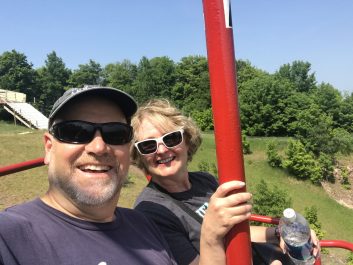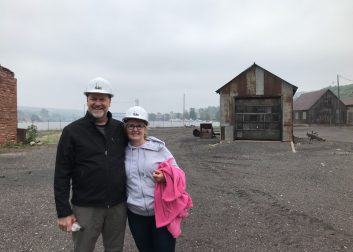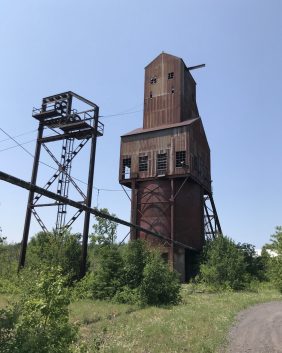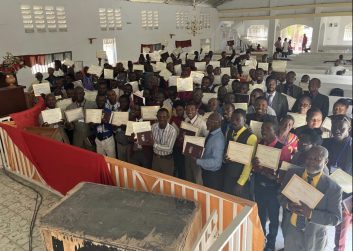 Rena and I just returned from some vacation time in Michigan’s Upper Peninsula. (Michiganians call it “the U.P.” and its hardy inhabitants “Yoopers.”) We started our sabbath with a Michigan history conference in Iron Mountain. After that, we moved up to the town of Calumet and dove deep in the copper mining story of the the Keweenaw Peninsula. Of course, that included coffee shops, restaurants, and some hiking and biking and sunsets on Lake Superior! [If you prefer, you can watch a video of this post HERE.]
Rena and I just returned from some vacation time in Michigan’s Upper Peninsula. (Michiganians call it “the U.P.” and its hardy inhabitants “Yoopers.”) We started our sabbath with a Michigan history conference in Iron Mountain. After that, we moved up to the town of Calumet and dove deep in the copper mining story of the the Keweenaw Peninsula. Of course, that included coffee shops, restaurants, and some hiking and biking and sunsets on Lake Superior! [If you prefer, you can watch a video of this post HERE.]
Michigan’s copper mining history fascinated us – the geology, technology, economics and, especially, the people. Between 1850 and 1950, thousands of people emigrated to the U.P. from northern and eastern Europe to work in the mines. In the early 1900s, you could have walked down Main Street in Calumet and heard a dozen distinct languages. Different as they were, all these people were seeking one thing – opportunity. Instead, most experienced back-breaking, soul-wearying, dangerous work for subsistence wages.
 It really hit home for us when we toured the Quincy mine. Our tour guide told us that, for 10 hours a day and six days a week, men worked a mile underground in near-total darkness. Without safety gear, they teetered on angled ledges of the mine to hammer, drill and gather mineral-laden rock. In most years, 1 in 3 workers died or were injured. The tour guide ribbed us, “Once you go down in the mine, you’ll never complain about your job again.”
It really hit home for us when we toured the Quincy mine. Our tour guide told us that, for 10 hours a day and six days a week, men worked a mile underground in near-total darkness. Without safety gear, they teetered on angled ledges of the mine to hammer, drill and gather mineral-laden rock. In most years, 1 in 3 workers died or were injured. The tour guide ribbed us, “Once you go down in the mine, you’ll never complain about your job again.”
I’m so thankful that we live now. Most jobs in our country are easier (at least physically) and safer than they were a century ago. We have more opportunity for education, training and resources in our lifetime than people who lived 100 years ago even dreamed of. We Americans, that is.
 As we toured typical miners’ homes, I said several times, “They use that in Haiti.” Charcoal for cooking, simple tools for sewing or baking, one light-bulb for the home (usually solar-powered in Haiti) – so many people in poor countries live now like people did in the United States a century ago. And like the Michigan miners, these people are hard-working and creative. They enjoy their friends, love their families and want their children to have a better life. Each person displays the creative work of a loving God, just as we Americans do.
As we toured typical miners’ homes, I said several times, “They use that in Haiti.” Charcoal for cooking, simple tools for sewing or baking, one light-bulb for the home (usually solar-powered in Haiti) – so many people in poor countries live now like people did in the United States a century ago. And like the Michigan miners, these people are hard-working and creative. They enjoy their friends, love their families and want their children to have a better life. Each person displays the creative work of a loving God, just as we Americans do.
But they lack, in a word, opportunity. Opportunity to be educated, trained and resourced. Opportunity to connect their work with the formal economy in order to improve their incomes. Opportunity to participate meaningfully in choosing (and dismissing) governmental leaders. Opportunity to provide a better life for their children and community.
 In a word, Partnership of Pastors International gives opportunity to front-line church leaders in Haiti and, Lord willing soon, additional developing nations. This is why we offer foundational training in locations accessible to the greatest number of church leaders. This is why we keep going to Haiti despite the problems and danger. People created in God’s image and loved by Him should be loved and honored by us. They should enjoy the same essential opportunities that we do to better their calling and lives. How can we keep to ourselves all the opportunities and resources we have here? How can we go our merry way knowing that people like us eek out back-breaking, soul-wearying, dangerous lives on subsistence wages? This week. Today.
In a word, Partnership of Pastors International gives opportunity to front-line church leaders in Haiti and, Lord willing soon, additional developing nations. This is why we offer foundational training in locations accessible to the greatest number of church leaders. This is why we keep going to Haiti despite the problems and danger. People created in God’s image and loved by Him should be loved and honored by us. They should enjoy the same essential opportunities that we do to better their calling and lives. How can we keep to ourselves all the opportunities and resources we have here? How can we go our merry way knowing that people like us eek out back-breaking, soul-wearying, dangerous lives on subsistence wages? This week. Today.
I thank God that so many of us can’t! Thank the Lord, we have opportunities to work together to provide essential opportunities and resources to church leaders, their families and congregations. I’m convinced this is one of the most significant opportunities we will have in this lifetime to make a difference for eternity. Let’s make the most of it for the glory of our Savior and the good of people precious to Him!